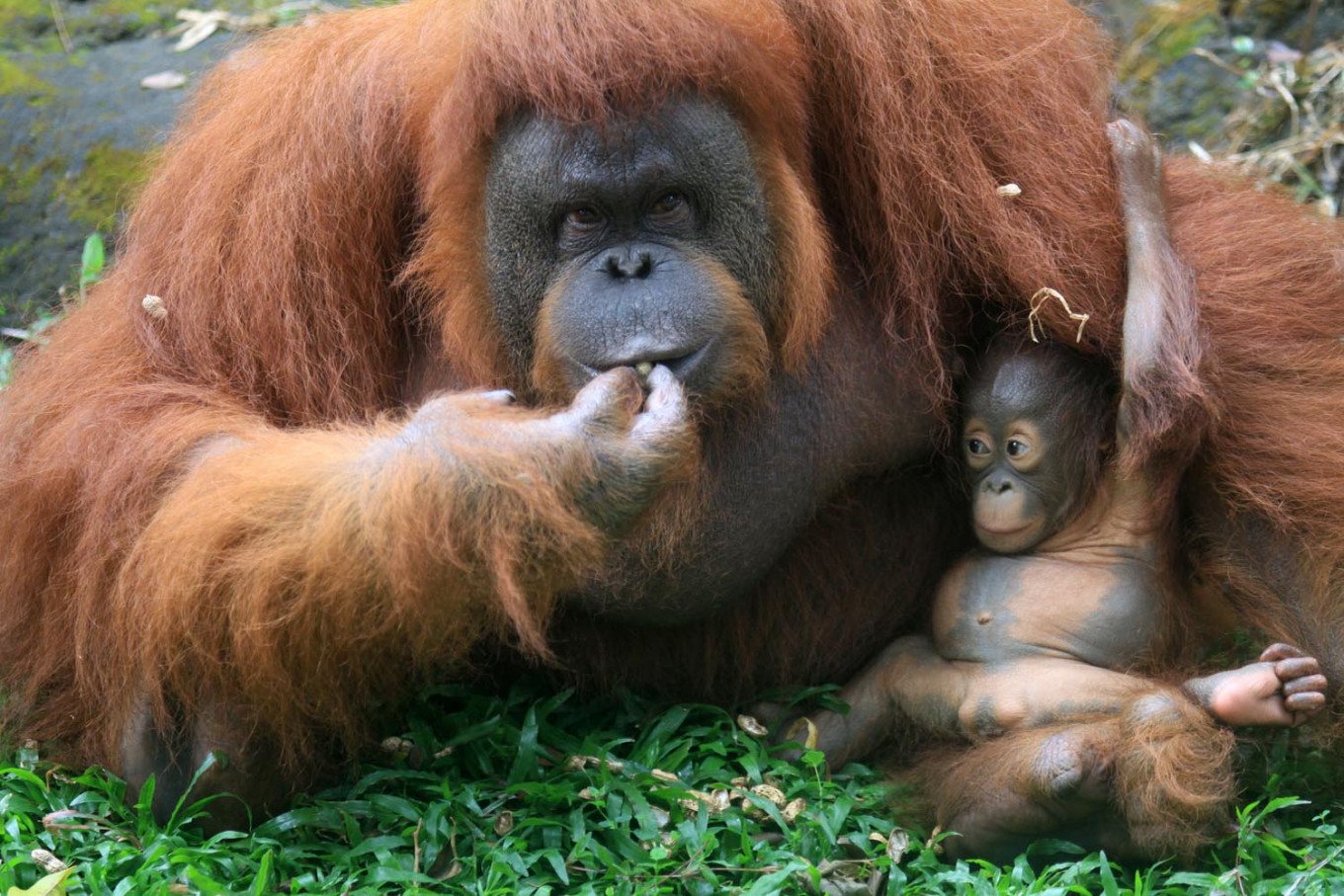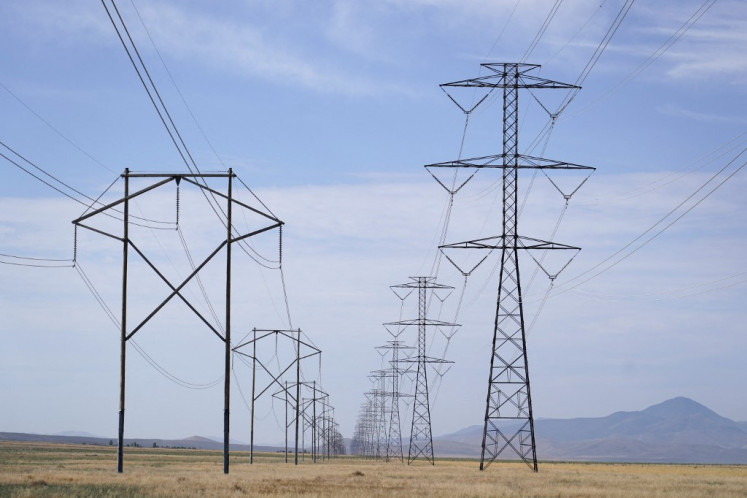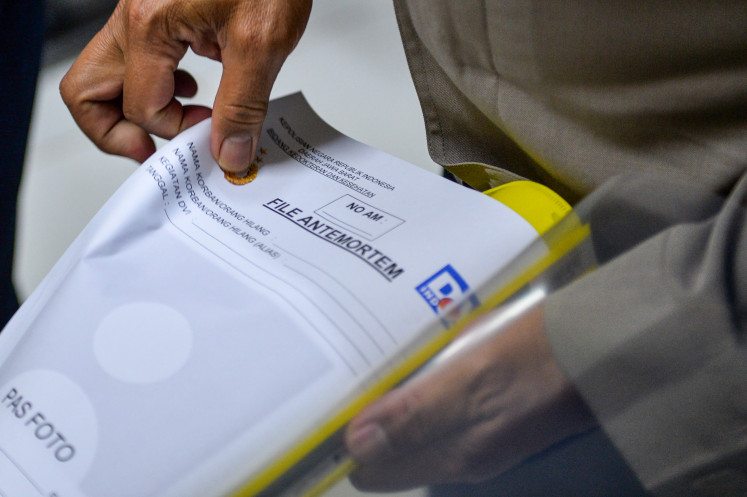Do orangutans need humans, or vice versa?
Orangutans are an umbrella species, which means that in protecting them, we indirectly protect other fauna and flora that live in the same ecosystem.
Change text size
Gift Premium Articles
to Anyone

“You’re going to such great lengths just for orangutans,” my children commented as I got ready to leave the house in my orangutan-related attire. On almost every occasion, I would wear something promoting orangutan conservation: a T-shirt, backpack, hat or luggage bearing the logo of the Borneo Orangutan Survival (BOS) Foundation, as well as our uniform that has a close-up of an orangutan’s face on it.
It is my way of making a statement, promoting and campaigning about the importance of orangutans in the hope that someone would notice, observe and eventually want to have orangutan-related merchandise. For me, this is business as usual and not going to any great lengths for orangutans.
Most people would probably think the same as my children do. Especially when planning for Orangutan Day, a special day that falls on Aug. 19, they say that it’s too much, how me and all staff at the BOS Foundation continue to dedicate ourselves to orangutans and conserving their habitat, as well as in celebrating orangutan conservation efforts.
After all, doesn’t circling a date on the calendar mean something important is happening that day? Moreover, Orangutan Day was established out of concern over the chaotic efforts in orangutan conservation, including fragmented habitat conservation, which exacerbates the threat to all wildlife, ranging from illegal hunting to losing some of Indonesia’s endangered great apes that play an important role in our rainforests, especially in Kalimantan and Sumatra.
Orangutan Day is not about romanticizing how cute a baby orangutan is. The basic question we ask ourselves when celebrating Orangutan Day is: “Do orangutans need humans, or do humans need orangutans?”
This question is not mere empty words spoken from a podium or displayed on banners: It is reflection. We need to reflect on existing issues and consider which actions we need to take, because time is not on our side. We are far behind and whether we like it or not, we need to catch up and fix all the issues jeopardizing our planet for all earthlings, as human beings are not the only living creatures on Earth.
No matter how big, glamorous or grand the Orangutan Day celebration may be, it will have no meaning if we cannot follow up with concrete action to save orangutans.
“Save orangutans so humans can survive, or save orangutans because they need help?” is another question we need to ask ourselves.
There are several points to answer this question. Orangutans play a role in the rainforest as an umbrella species, meaning that if we take care of orangutans, we are also taking care of the various flora and fauna living in the ecosystem where orangutans live.
As a frugivore, an animal that primarily eats fruit, orangutans can travel up to 100 hectares during a single day to find food and scatter the seeds of the fruit on the forest floor. At night, they sleep inside nests that they build. Making nests is a unique phenomenon that is part of natural law.
Orangutans make nests by breaking, bending and winding branches into shape, which allows sunlight to reach the forest floor. This activity allows the seeds they spread to grow into seedlings as God wills.
We need to realize that orangutans are gardeners of the forest and allow it to regenerate effectively. When a forest regenerates, its function as a key source of human needs is maximized. In other words, human beings are the main beneficiaries of this function.
The forest provides clear water, oxygen and timber as well as non-timber resources, all of which are vital to providing quality life for human beings. If the forest fails to regenerate, we will soon lose our primary source of the oxygen we need to breathe and live.
The next point of reflection is: Will orangutan extinction be a problem for human beings? If the planet loses orangutans, it will compromise ecosystem balance.
Orangutan extinction is similar to removing a single bolt from an airplane hull. We can say that the airplane can still fly, but it is flying with a defect. Can you imagine how you would feel as a passenger if you were told that a bolt is missing from the plane? Can you still board the airplane with full confidence? I would bet no one would want to.
The orangutan is under dire threat. Illegal hunting and habitat loss as a result of forest conversion to fulfill human needs are pushing them to the brink. This is a challenge we must face together to ensure that continuation of orangutans in the rainforest, because we need them. For the future of our species and the sustainability of our planet, we must not let orangutan extinction to become our legacy for our grandchildren, who will learn about it when they hear about orangutans in storybooks and fables of an imagined future when orangutans no longer exist.
We need orangutans as God appointed them their habitat, long before we even existed. Who are we to deny what God has provided for our benefit? Let’s take concrete action and work toward saving the orangutans in the wild.
***
The writer is CEO of BOS Foundation.









